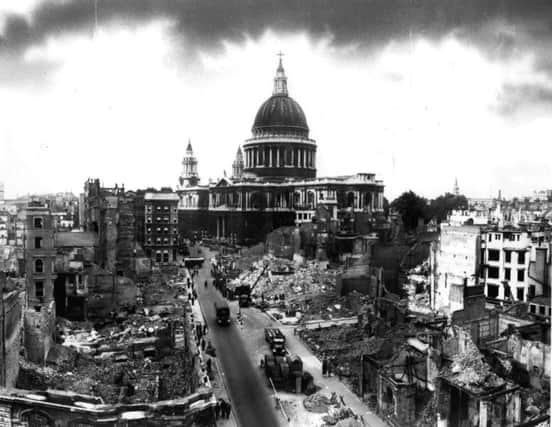Lori Anderson: BBC facing flak over Blitz Cities


It was once said: “don’t mention the war” but in recent years it seems we can talk of nothing else. The question is: which war? Last year the centenary of the outbreak of the First World War dominated the BBC and now this year normal service has been resumed with the focus on the 75th anniversary of key dates in the Second World War. One imagines that many of us would be war-weary but instead it appears that our appetite for destruction remains unsated.
This week the BBC has been strafed and bombed by critics over Blitz Cities, a five-part documentary series which has been broadcast each night this week to mark the 75th anniversary of Germany’s aerial attacks on Britain during the Second World War. The raids, which ran primarily between 7 September 1940 and 21 May 1941, killed tens of thousands across the nation but the BBC have chosen to concentrate on five cities – London, Liverpool, Norwich, Cardiff and Birmingham – and have the story of each city’s ordeal and that of its citizens told by a prominent celebrity from each town. Shane Ritchie from EastEnders began the series on Monday by telling the story of the London Blitz, followed by Ricky Tomlinson (Brookside) on Liverpool; Myleene Klass (white bikini) on Norwich, John Humphrys (the Today Programme) on Cardiff and David Harewood (Homeland) on Birmingham.
Advertisement
Hide AdAdvertisement
Hide AdThe city most noticeable by its absence is Hull, which suffered more devastation per square mile than any other city in Britain, and this week local historians accused the BBC of putting celebrity before historical accuracy and ignoring the suffering of the nation’s most bomb-damaged city. Dr Robb Robinson, a historian at Hull University, was quoted as saying: “The city’s suffering is often forgotten. It is symptomatic of the approach the BBC in London has to the regions. It also seems to be confusing history with celebrity.” The bombing of Hull resulted in the deaths of 1,200 people with 95 per cent of the city’s housing damaged and 152,000 people left homeless. At the time the devastation of Hull, as with that of other cities, was classified so as to avoid giving succour to the enemy, with the full story only emerging in the 1970s.
If Hull had a large enough celebrity then it might well have been picked as a BBC spokesperson appears to suggest: “To mark the anniversary of the Blitz the series sends famous faces around – and above – their home city to meet people who lived through the bombing. As such, cities were chosen because of the celebrities association with them… Although focusing on these particular cities, however, we hope the series as a whole does reflect the country’s experience during these years.”
The frustration felt by the residents of Hull is understandable as they believe the focus appears to have been on the availability of the celebrity, rather than the suitability of the city. The absence of Scotland from the series is also bound to upset “viewers in Scotland”, especially at a time when the BBC is anxious to bind up the wounds following last year’s referendum. Scotland had a suitable celebrity in the form of Kevin Bridges, a hugely popular comedian who is favourably compared to Billy Connolly and one whose home town of Clydebank suffered two devastating bombing raids over consecutive nights in March 1941.
I would have liked to have seen Kevin Bridges, who has a warm and engaging manner perfect for TV presentation, educate a new generation of viewers on the horrors of the Clydebank Blitz.
As the town, just outside Glasgow, was home to both John Brown’s shipyard and the Beardsmore Diesel works, it was a prime target for the Luftwaffe bombers who wanted to disrupt Allied shipping. On the evenings of 13 and 14 March 1941, hundreds of German bombers filled the night sky and began dropping thousands of high explosive and incendiary bombs.
As one eye witness recalled: “I heard the siren and we ran from the hospital to get to the shelter. It was like daylight. They were dropping flares. I couldn’t believe it. They were so low I could see the crosses on their wings. And the noise. I’ve never seen so many aeroplanes. They passed overhead and within minutes we could see the red glow above Clydebank.”
Over those two terrible nights 528 men, women and children were killed with 700 injured and tens of thousands left homeless in what Les Taylor, in his book Luftwaffe Over Scotland, described as “the most cataclysmic event” in Scotland during the Second World War. Nearly every home in the town was either damaged or destroyed, a giant bomb crater 30 feet wide and 20 feet deep damaged the water supply severely hampering the overwhelmed fire brigade. The memory of one witness captures the horror: “I saw a little girl standing at an upstairs window. She was about seven years of age. The house was blazing. I had been doing things, helping. There was no way I could get to her. The room caved in and she disappeared. Seeing that changed my life.”
Four years ago the events of the Clydebank Blitz were rescued from the fog of war by the diligent research and eloquent writing of John McLeod, who published the most moving and detailed account of the bombing in his book River of Fire. Yet very few books, even best-sellers, can attract and inform as many people as a television documentary, especially one fronted by a popular celebrity who, despite the mutterings of historians, can fulfil an important service and act as a human search-light guiding the unfamiliar to a sad and bloody moment in contemporary Scottish history.